Strange Darling Blu-ray Movie
HomeStrange Darling Blu-ray Movie 
Magenta Light Studios | 2023 | 96 min | Rated R | Nov 05, 2024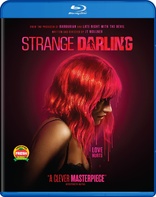
Movie rating
7.4 | / 10 |
Blu-ray rating
| Users | 0.0 | |
| Reviewer | 4.5 | |
| Overall | 4.5 |
Overview
Strange Darling (2023)
Nothing is what it seems when a twisted one-night stand spirals into a serial killer's vicious murder spree.
Starring: Willa Fitzgerald, Kyle Gallner, Barbara Hershey, Ed Begley Jr., Steven Michael QuezadaNarrator: Jason Patric
Director: JT Mollner
| Thriller | Insignificant |
| Horror | Insignificant |
Specifications
Video
Video codec: MPEG-4 AVC
Video resolution: 1080p
Aspect ratio: 2.39:1
Original aspect ratio: 2.39:1
Audio
English: DTS-HD Master Audio 5.1
Subtitles
English SDH
Discs
Blu-ray Disc
Single disc (1 BD)
Playback
Region A (B, C untested)
Review
Rating summary
| Movie | 4.5 | |
| Video | 4.5 | |
| Audio | 4.5 | |
| Extras | 0.5 | |
| Overall | 4.5 |
Strange Darling Blu-ray Movie Review
Reviewed by Justin Dekker October 25, 2024The horror film which Stephen King referred to as "A clever masterpiece" arrives on Blu-ray courtesy of Magenta Light Studios. Directed by JT
Mollner, his second feature film stars Willa Fitzgerald ('Reacher', 'Dare Me') and Kyle Gallner ('Smile', 'Smile 2') with Ed Begley, Jr., and Barbara
Hershey showing up in supporting roles. Also of note is the fact that Giovanni Ribisi serves as the Director of Photography for the first time on a
feature film. The release is devoid of Supplemental Material save for a trailer. Neither a slipcover nor a Digital Code is included.
If you have not yet seen Strange Darling, reading reviews of the film is a dangerous proposition. If you're a horror fan and are wondering
whether or not you should pick
up a copy, you probably should. If you're wondering how the film looks and/or sounds, scroll down to the appropriate sections below and check
them
out, but don't read anything more than that, not one single additional word of this review before you've seen the film for yourself. Once you've
seen Strange Darling please do come back and read this review in its entirety. It's simply that so much of the film's enjoyment is in
approaching it flat-footed, knowing nothing, or at least as little as possible, about the film. All you truly need to know is that it's good, horror fans
need to see it, and if you're still reading, you're either not very good at following directions or you've already watched the film. But if you've yet to
see it, seriously, please, as stated above, grab a copy (being careful not to read anything beyond the title on the cover), give it a spin, and come
back once you've seen it because as mightily as I will try to write about this film without spoiling any of it, that's virtually impossible to do. Still, I'll
give it a go. Just don't blame me if you haven't seen it, have kept reading, and now have been robbed of at least some of the joy to be found in the
film's all-too-brief 96 minutes. You've been duly warned.
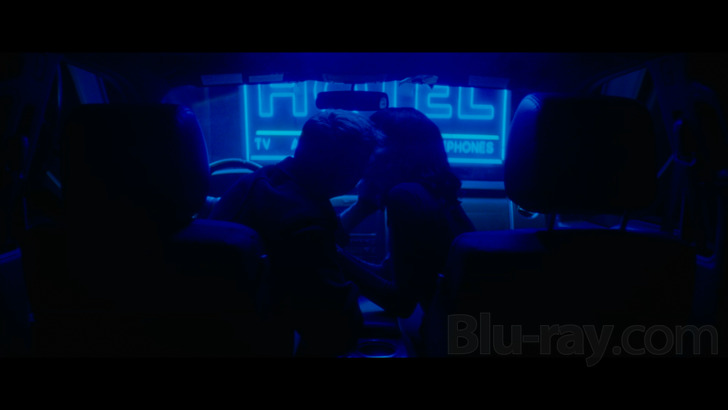
There's a saying that I've heard several different places that seems central to the concept of Strange Darling: "Men are afraid women are going to laugh at them. Women are afraid men are going to kill them.". It was said by Gillian Anderson's character in the wonderful series The Fall (2013-2016), which also focuses on a serial killer, and it's been sung by Courtney Barnett (though with the word "scared" instead of "afraid") in her song "Nameless, Faceless". And it's true, highlighting just one of the ways the world is experienced differently for those who inhabit this planet based simply on their gender. That notion is brought immediately and directly into focus with the film's very first lines of dialogue when Willa Fitzgerald's character (known only as "the Lady") asks Kyle Gallner (identified in the opening credits as "The Demon") if he's a serial killer in the film's opening seconds. It's a clever use of dialogue. That question instantly puts the viewer on edge, alerting us that there is something that we need to be on guard against or afraid of. But it's also a terribly pointless question. Gallner's character only has one possible response. He has to say, "No". But the time it takes him to respond to the question and the way in which he does finally respond works to increase the level of fear and build distrust. Shot in black and white, it's especially ominous. This tiny snippet of dialogue, when coupled with the images that flash on the screen as the pair smoke in the parking lot of a cheap motel, effortlessly and quickly sets the stage for everything that is to follow.
The film plays out in six intentionally scrambled chapters in a manner not dissimilar to Pulp Fiction and Memento whose use of a nonlinear structure was critical to confound, confuse, and surprise audiences. The same is true here. Each chapter brings new parts of the narrative and connections are able to be created and revised, enabling the whole to finally materialize. If there were an option on this disc to watch the chapters in order as has been possible on certain home video releases of Memento, Strange Darling would still be an interesting and entertaining film, but it works much better with this structure. Here the film starts with "Chapter 3", which for all intents and purposes is the middle of the picture. So much has happened that the viewer is not yet privy to, being forced to craft their own narrative to fill in the blanks on how Fitzgerald and Gallner's characters could have gotten to this point of escalated action and terror. This chapter also plays out with an absolute minimum of dialogue. It's another tool to drive fear and tension and further confound audiences, providing no clues as to what the characters may be thinking or feeling beyond what is revealed by their actions. Once given a chance to see The Lady and The Demon at the violent point where the film begins, Strange Darling bounces around, taking us further into trouble, back to the beginning of the night when the world was still a safe and familiar place, and beyond.
Upon watching this film a second time, it appears that color is another tool the film uses to inform critical scenes and characters. Blues are typically used in the film's calmer, more intimate moments, such as when the two leads smoke and flirt in the cab of Gallner's truck as it's parked at the "Blue Angel", the pair bathed the sign's blue neon glow. Though in public, the pair are alone in this small world and are free to discuss their thoughts, feelings, fears, and desires. As the driver, Gallner holds the power, but it's a safe space, with each appearing as vulnerable as the other. But their conversation, for all of its congeniality, has an edge to it, heading into territory many would likely not have so frankly on a one-night stand, if ever. If the presence of blue signifies an environment of real or intended intimacy, it can be no coincidence that the bedspread in the motel room is also predominantly blue. Red is also, unsurprisingly, a critical indicator of what is to come. It being the color most closely associated with anger, blood, and violence, and given the nature of the film, there is a fair amount of red to be found in shot after shot in various lighting choices and set elements. The red light that engulfs one of the characters foreshadows the upcoming violence, and this notion translates to costume choices as well, with those wearing red the most capable of and prone to violence.
For any film with a small cast, the quality of the leads is of the utmost importance. Both Fitzgerald and Gallner, being fully committed to their characters, connect quickly with the viewer, each working to build some quantity of trust, fear, sympathy, and/or antipathy. Each fills their character with nothing more than is human. So often in horror films the heroes and especially the villains can at times become almost superhuman. While both can shrug off serious injury (though this is more the province of the villain), villains are often unerringly perceptive and able to locate their prey with ease. No hiding place is safe (unless it needs to be to pad the film's runtime). Heroes, meanwhile often make ridiculously poor decisions for no greater or better reason than to extend the film and increase the body count. This particular trope has persisted and escalated to the point where such behavior is even mocked in television commercials. Not so here. In Strange Darling actions that result in injuries have consequences, and the pair does suffer. But each accumulating injury and the effects of various drugs realistically inform their portrayal of their respective characters. Movement is inhibited, energy wanes or is artificially bolstered, gross and fine motor skills are impacted, and judgment and critical thinking are suitably diminished. Decisions may be hastily arrived at and desperate in their origins, but there's a logic and resourcefulness to them. They may not be optimal, but in the moment they're credible choices any of us might make. As a result, one consistently believes these are real people working through these situations. They don't possess any special knowledge or skill that may differentiate them from the bulk of the population. These are "normal" people. The only real exceptions to that are the somewhat intentionally quirky and comedic pairing of Barbara Hershey and Ed Begley, Jr.. The duo work on a ridiculous puzzle before engineering a breakfast that is equally likely to irreparably and fatally clog arteries as it is to induce a diabetic coma. But still, by the time the scene arrives, the audience can use a bit of break and the pair of veteran actors deliver some unexpected but much-needed laughs.
Strange Darling Blu-ray Movie, Video Quality 
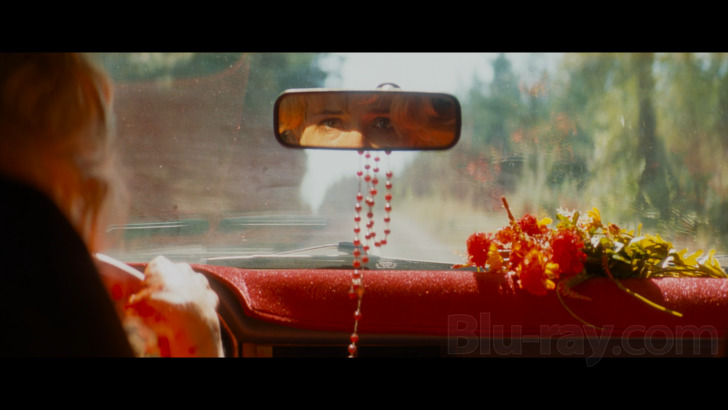
Viewers won't have to wonder long about how this film was shot, as in a move I can't recall ever seeing before, a graphic appears on the screen before the action of the film begins informing viewers that Strange Darling was "SHOT ENTIRELY ON 35MM FILM" (caps are in the original). Also worth noting is the fact that actor Giovanni Ribisi serves as Director of Photography on the project. He's worked in that capacity on commercials and music videos in the past and is a champion of the use of film over digital, but this is his first proper film in that position. The influence of his history of working on projects with some very impressive DPs is evident throughout the film. Being a product of film, Strange Darling yields excellent levels of detail, vibrant colors, and a great natural grain structure, all of which help to give the film the feeling of being a product from some days gone by, without ever being "grainy", gritty, or "grindhousey" in its appearance. Primaries, especially reds and blues are afforded many moments to pop in the sometimes heavily stylized shots. Exteriors, while infrequent, do arise early on to immerse the viewer in a lush and vibrant green world where detail levels are pleasingly high and depth and dimensionality are impressive. But for the most part, the film is a series of small set pieces with a few characters confined to small spaces. Here, fine detail is resplendent, whether it be the various trappings of the sleazy motel room at the Blue Angel or the overstuffed home shared by Barbara Hershey and Ed Begley, Jr. in which every room is bursting at the seams with decades of mismatched and random nick-nacks, or the scenes on their home's grounds which explode with an endless array of plants and landscaping elements.
Strange Darling Blu-ray Movie, Audio Quality 
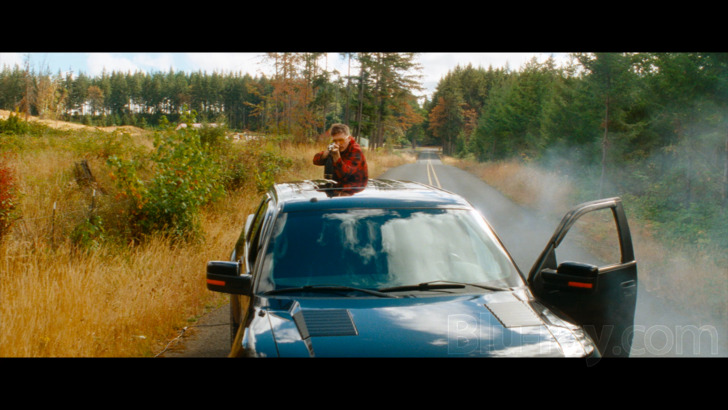
Strange Darling's English DTS-HD 5.1 audio track is more than up to what the film asks of it. Sound effects are faithfully rendered, beginning with the unmistakable sound of a Zippo lighter snapping shut and carrying over to breaking glass and gunshots. Surround involvement is impressive in musical stings and in moments when music is allowed to dominate, such as when a cover of "Love Hurts" plays out over the opening credits. Bass involvement, while not impressive here, is sufficient for the track, with the other instruments and vocals being reproduced with great fidelity. Directionality is excellent and is most often appreciated and evidenced with speeding vehicles. Here, the low end is given a moment to shine, providing larger engines deep, throaty rumbles, putting oomph in rifle and handgun blasts, and lending effective realism to crashing vehicles as well. Surround involvement is also consistently leveraged beyond the frequent musical elements, providing a host of atmospheric and ambient sounds to place the viewer on the road, in the forest, and on the comedic duo's property. Dialogue is clean, properly prioritized, and front and center focused. It's an extremely busy, ambitious, and involving audio track that nicely amplifies the mood of the film.
Strange Darling Blu-ray Movie, Special Features and Extras 
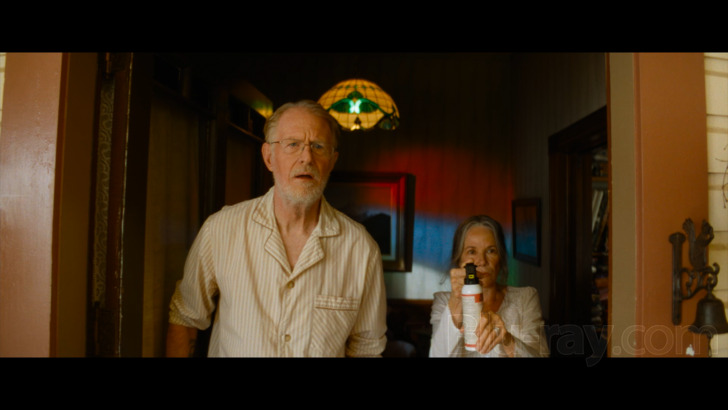
The sole supplemental feature is a green band theatrical trailer (1.48). May contain direct or interpreted/extrapolated spoilers.
Strange Darling Blu-ray Movie, Overall Score and Recommendation 
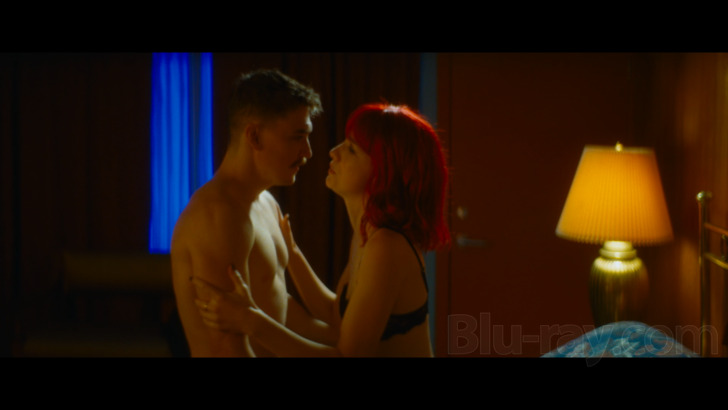
Is Strange Darling the masterpiece that Stephen King, the man whose name is synonymous with horror, says it is? While I am loathe to heap that much praise and hyperbole on any film, especially one that we haven't lived with for very long, Strange Darling is undeniably clever and entertaining. Remarkably so, in fact. Throughout the course of its 96 minutes, it gleefully plays with genre tropes and conventions as it weaves its modern tale of realistic horror and suspense. Making even the more mundane and intimate moments of the film something atypical and foreign to most viewers, there is never truly a moment during the film where the viewer can feel at ease. Not even at breakfast. In that regard, it does what many of the best horror films do; it uses every moment to disturb and create unease while never being more violent or graphic in the depiction of violence than it absolutely must. It's ever a solid mix of excess and restraint. Insofar as it remained enjoyable after three viewings in just two days, I'd contend that the film is certainly rewatchable and it's a title that should definitely be on the radar of every horror fan and the horror-curious looking for something beyond slasher franchises (not that there's anything wrong with them!) and relentless gore. Disappointingly void of any meaningful or substantive supplemental material but given a solid transfer and rollicking audio track, the film is more than enough all by itself to make Strange Darling, Ribisi's first outing as Director of Photography, highly recommended.
Similar titles
Similar titles you might also like

Scissors
1991

Last Shift
2014

Always Shine
2016

Grand Piano
2013

The Pack
2015

Piercing
2018

Bound to Vengeance
2014

B'Twixt Now and Sunrise
The Authentic Cut
2011

Last Embrace
1979

Open Windows
2014

Jackals
2016

The Victim
2011

Dementia 13
Director's Cut
1963

Salvage
2006

Trap 4K
2024

The Rental
2020

The Prodigy
2019

Bad Samaritan
2018

Greta
2018

Jigsaw 4K
2017